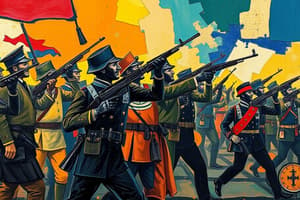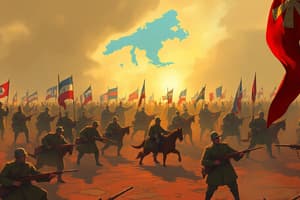Podcast
Questions and Answers
Which of the following alliances was NOT one of the main opposing alliances in World War I?
Which of the following alliances was NOT one of the main opposing alliances in World War I?
- Italy, Japan, Germany
- Germany, Austria-Hungary, Ottoman Empire
- United States, United Kingdom, France (correct)
- France, Russia, United Kingdom
What was the landmark case that declared 'separate but equal' in public schools unconstitutional?
What was the landmark case that declared 'separate but equal' in public schools unconstitutional?
- Plessy vs. Ferguson
- Brown vs. Board of Education (correct)
- Roe vs. Wade
- Miranda vs. Arizona
Who was a prominent leader of the Civil Rights Movement and advocated for nonviolent protest?
Who was a prominent leader of the Civil Rights Movement and advocated for nonviolent protest?
- Huey Newton
- Martin Luther King Jr. (correct)
- Malcolm X
- Thurgood Marshall
What was the primary focus of the Voting Rights Act of 1965?
What was the primary focus of the Voting Rights Act of 1965?
What is the primary cause of World War I commonly referred to as?
What is the primary cause of World War I commonly referred to as?
What is 'de facto segregation'?
What is 'de facto segregation'?
What was the main conclusion of the Kerner Commission?
What was the main conclusion of the Kerner Commission?
Which of the following was NOT a member of the Triple Entente?
Which of the following was NOT a member of the Triple Entente?
When did the Treaty of Versailles end World War I?
When did the Treaty of Versailles end World War I?
What was the purpose of the Freedom Riders?
What was the purpose of the Freedom Riders?
Who was the U.S. president when the United States dropped atomic bombs on Hiroshima and Nagasaki?
Who was the U.S. president when the United States dropped atomic bombs on Hiroshima and Nagasaki?
What was the main goal of the March on Washington?
What was the main goal of the March on Washington?
What was the primary objective of the Manhattan Project?
What was the primary objective of the Manhattan Project?
On which date did the Allied forces land in Normandy during World War II?
On which date did the Allied forces land in Normandy during World War II?
What was the purpose of the Selective Service Act enacted in the United States?
What was the purpose of the Selective Service Act enacted in the United States?
Which of the following was a member of the Central Powers in World War I?
Which of the following was a member of the Central Powers in World War I?
Flashcards are hidden until you start studying
Study Notes
WWI and WWII
- The primary cause of World War I is known as MANIA, which stands for Militarism, Alliances, Nationalism, Imperialism, and Assassination.
- The Triple Entente consisted of France, Russia, and the United Kingdom.
- The Treaty of Versailles was signed to end World War I, not World War II.
- Harry Truman was the U.S. president who authorized the use of atomic bombs on Hiroshima and Nagasaki.
- The primary objective of the Manhattan Project was to develop the atomic bomb.
- Key dates to remember:
- D-Day: June 6, 1944
- V-E Day: May 8, 1945
- Pearl Harbor: December 7, 1941
- Hiroshima Bombing: August 6, 1945
- The Selective Service Act was enacted to draft soldiers for World War II.
- The Central Powers in WWI consisted of Germany, Austria-Hungary, and the Ottoman Empire.
Civil Rights
- The landmark case that declared "separate but equal" in public schools unconstitutional is Brown vs. Board of Education.
- Martin Luther King Jr. was a prominent leader of the Civil Rights Movement and advocated for nonviolent protest.
- The Civil Rights Act of 1964 ended segregation in public places and banned employment discrimination.
- The primary focus of the Voting Rights Act of 1965 was to eliminate racial discrimination in voting.
- The term "de facto segregation" refers to segregation that occurs in practice, but is not enforced by law.
- Key events and descriptions:
- March on Washington: A major civil rights rally where MLK delivered his "I Have a Dream" speech
- Freedom Riders: Activists who rode interstate buses to challenge segregation
- Black Panthers: Group that advocated for African American rights, sometimes through militant means
- Kerner Commission: Investigated the causes of the 1967 race riots
- The main conclusion of the Kerner Commission was that America was moving toward two separate and unequal societies.
Studying That Suits You
Use AI to generate personalized quizzes and flashcards to suit your learning preferences.





